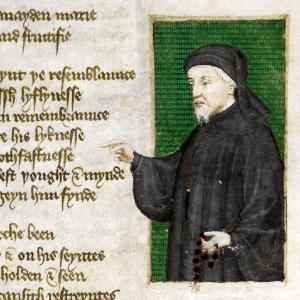News
ATNU Virtual Speaker Series - Sophie Whittle - 2024-12-11

Our next speaker in the ATNU Virtual Speaker Series is Dr Sophie Whittle from the Digital Humanities Institute, University of Sheffield who will talk to us about "Probing LLMs’ interpretation of Chaucer’s Canterbury Tales: Reflections on the use of generative AI for digital scholarly editing and the university classroom".
Join us on Wednesday 11 December 2024 at 5pm UK time. (We will send the zoom link to all registered attendees shortly before the event.)
"Probing LLMs’ interpretation of Chaucer’s Canterbury Tales: Reflections on the use of generative AI for digital scholarly editing and the university classroom"
Sophie Whittle (Sheffield University)
Wednesday 11 December 2024
5pm (GMT) (9am PT, 12pm ET) [Check your timezone here!]
REGISTER HERE
Abstract:
It is well-known that there is growing hype and fear around generative AI and Large Language Models (LLMs), and their impact on education, public sectors, and creative industries, to name a few. The way in which we approach the use of these technologies now may influence their advancements for future generations.
For the past year, I have been working on the C21 Editions project, where we assessed machine-assisted methods for the development of a prototype teaching edition of Geoffrey Chaucer’s Pardoner’s Tale from The Canterbury Tales. In this talk, I present my reflections when challenging LLMs’ translation, annotation and ‘interpretation’ of the text. I also explored whether generative AI recognised the tale’s position within a complex textual tradition, its literary criticisms, linguistic variation through time, and more specifically, whether it draws on marginalised communities’ stories within a larger ‘canonical’ text.
Our research draws on the insights of the students, lecturers, researchers and editors we interviewed at various stages of the project. I also build on the large body of research within contemporary Chaucerian discussion, queer and intersectional approaches to the Tales, and recent research arising from the Critical AI journal at Rutgers, to support the identified disparities between generative AI outputs and long-standing editorial practices. By combining these approaches, I highlight the benefits and limitations of including LLMs within the framework of a pedagogical edition. I am also interested to hear the challenges you have faced as teachers, researchers, students, and users, in a digital age that demands our attention to, and awareness of, these technological developments, so we can continue an interdisciplinary dialogue around its growing consequences for educational contexts.
Bio:
Sophie Whittle is a Research Associate in the Digital Humanities Institute (DHI), University of Sheffield, responsible for developing the research theme of Machine-Assisted Scholarly Editing in the department. She recently worked on the C21 Editions project in the DHI, where she developed a prototype digital teaching edition of Chaucer’s Pardoner’s Tale using machine-assisted methods. She received her PhD in linguistics from the School of English at Sheffield, and her thesis explored motivations for language change in the history of English. Here, she worked with quantitative and qualitative corpus-based methods to analyse specific syntactic phenomena in historical texts, and investigated theories of language contact and acquisition on variation.
Last modified: Mon, 18 Nov 2024 15:12:32 GMT
